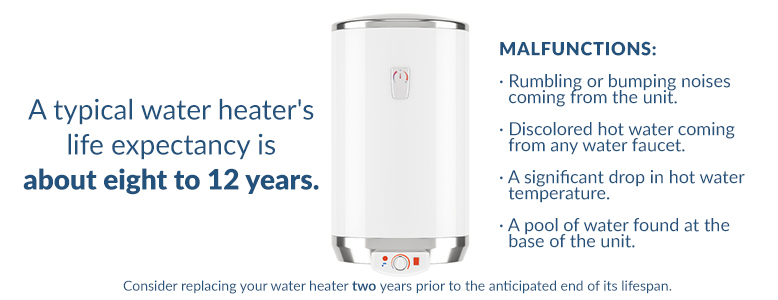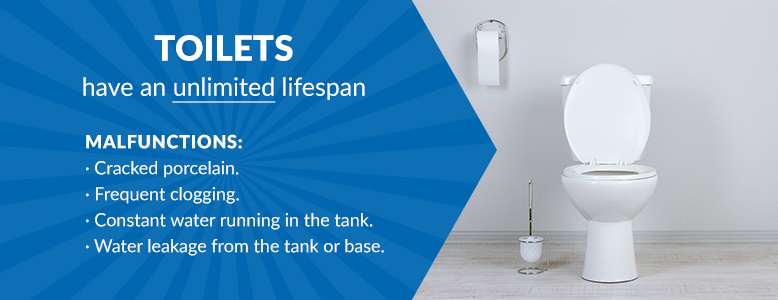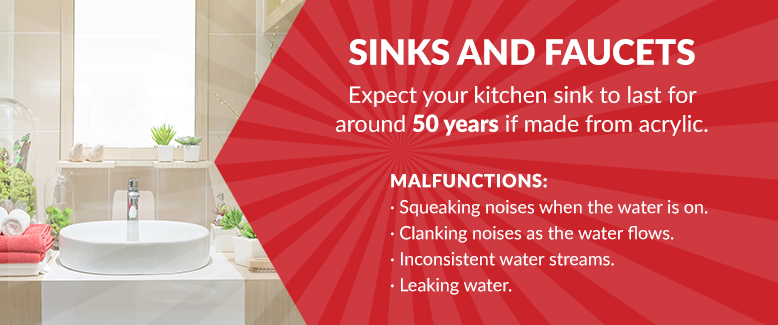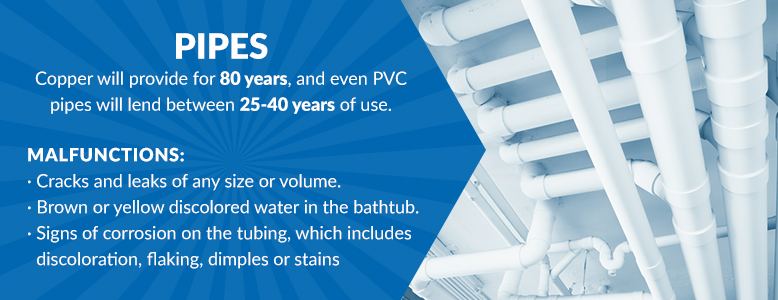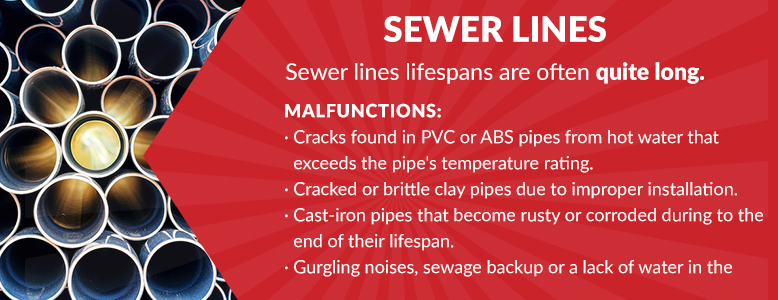
With a range of appliances working hard day and night, your home truly has a life of its own. Your plumbing system provides you with clean water at a moment's notice, while your dishwasher, laundry machines and other appliances help you keep your home running smoothly week after week. Consider just how many individual appliances you rely on to accomplish your daily routine:
- Water heater
- Toilets
- Sinks
- Garbage disposals
- Dishwashers
- Washing machines
- Pipes
- Sewer lines
- Septic systems
- Leach fields
There's no denying that the appliances and systems in your home help you live comfortably from day to day. As a homeowner, you want to get the most out of every investment you make in your home. Being aware of the appliance lifespans and performing preventative maintenance on these units can help you extend their life cycles, spare you from needless inconveniences and reduce potential repair or replacement costs.
The Life Expectancy of Appliances and Plumbing Systems in Your Home
Life expectancy refers to the estimated length of time an appliance should continue to function properly without needing to be replaced. Nearly every aspect of your home, from the cabinets and caulking to the flooring and framing, has an average life expectancy. While elements like your concrete foundation and countertops may last for a lifetime, many of your home appliances may only have a life expectancy of 20 years or less. Knowing the right time to replace these machines can save you time, money and hassle.
As your helpful neighbor, our trusted team of Mr. Rooter plumbing professionals have compiled a list of the most common home systems. We're pleased to provide you with information regarding each appliance's average lifespan, typical symptoms of a malfunctioning unit, tips on maintaining the appliance and when you should consider replacing it. Of course, you can always count on Mr. Rooter for 24/7 emergency plumbing repairs. We're ready to provide you with fast and friendly service any time of the day or night with no extra after-hours fees.
Appliance Lifespans
Here is a look at some common appliances and their lifespans:
1. Water Heater
Average Lifespan: Water heaters can be separated into two categories: tank and tankless. The most common are conventional water heaters that have tanks capable of holding between 30 and 80 gallons of water. A typical water heater's life expectancy is about eight to 12 years. Because tankless heaters provide hot water on demand, unlike tanks that continuously function, they may last for 20 years or longer. Electric pump heaters should last as long as a conventional tank, while a solar-powered heater should last as long as a tankless.
Symptoms of a Malfunctioning Unit: There's always a chance that your water heater may show signs of wear and tear as time passes. Some symptoms of an aging water heater you should be aware of are:
- Rumbling or bumping noises coming from the unit.
- Discolored hot water coming from any water faucet.
- A significant drop in hot water temperature.
- A pool of water found at the base of the unit.
When You Should Replace Your Water Heater: Think about all of the ways you utilize hot water in your home — taking showers, washing hands, cleaning dishes and doing laundry are just some of the many reasons you need reliable hot water available at all times. Should you replace your water heater before it fails? Ideally, yes. Consider replacing your water heater two years prior to the anticipated end of its lifespan. This means roughly at the eight to 10-year mark for tanks and the 15 to 18-year mark for tankless heaters.
Mr. Rooter's Tips: No one wants to go without hot water in their home. Thankfully, there are ways you can help increase the longevity and efficiency of your hot water unit. You can drain or flush your water heater once a year to wash away the mineral deposits that build up. You can also lower the temperature on the tank when you go on vacation and make sure your tank and pipes are insulated throughout the year.
Annual maintenance inspections will also keep you aware of any problems that may develop.
2. Toilets
Average Lifespan: Do toilets wear out? Most are built for the long haul, having a lengthy lifespan that's virtually unlimited. While the seat and structure itself may last, though, the other components like the flapper, handle and fill valve may require attention every few years. Luckily, these are often quick and easy repairs.
Symptoms of a Malfunctioning Unit: Make no mistake — while hot water is important, a working toilet is perhaps one of the most essential facilities in your home. When a toilet is out of commission, it's an immediate problem that inconveniences the entire household. While small clogs are inevitable, there are a few other common signs of a bad toilet you should stay aware of, including:
- Cracked porcelain.
- Frequent clogging.
- Constant water running in the tank.
- Water leakage from the tank or base.
When You Should Replace Your Toilet: Of course, no one wants to replace their toilet if they don't need to. However, if the repairs are becoming too costly or too frequent, it may be more affordable to replace the toilet entirely. If you're having to excessively unclog or perform other maintenance functions on the toilet, a new purchase may be worth the time and repair expenses saved. Most importantly, if you see cracks in the porcelain, even small hairline cracks, immediately replace it to avoid a complete breakdown.
Mr. Rooter's Tips: With proper maintenance, you can help keep your toilet in working condition. Occasionally inspect the items inside the tank, like the flapper and fill valve. If these parts look damaged or don't seem to be functioning correctly, replace them. It's also imperative to monitor the toilet for internal or external leaks as they could cause serious problems like flooding or mold growth. If you believe you have a serious leak issue, let Mr. Rooter Plumbing assess the problem.
3. Sinks and Faucets
Average Lifespan: Expect your kitchen sink to last for around 50 years if made from acrylic. Vessel sinks made from copper, porcelain, glass or store could last more than 20 years, while enameled steel kitchen sinks may only last over a decade. Soapstone sinks, however, could last for over a century. How long do kitchen faucets last? You should expect to them to last for at least 15 to 20 years unless damaged by events outside of regular wear and tear.
Symptoms of a Malfunctioning Unit: Some homeowners may not think that a leaky faucet is a big deal, but that constant dripping you hear could increase your water bill. For example, a home with three faucets that each leak one drip per minute would be wasting an entire liter of water per day. That means the homeowner would be paying for 104 gallons of unused water per year. Don't let your budget spiral down the drain. Be aware of potential sink or faucet issues, including:
- Squeaking noises when the water is on.
- Clanking noises as the water flows.
- Inconsistent water streams.
- Leaking water.
When You Should Replace Your Sink or Faucet: The largest issue you'll likely face is a leak, which is commonly attributed to problems with old or worn components, fittings, pipes or seals. These items can be easily and affordably replaced. Regular cleaning will also keep your sink free of scratches, stains and mineral buildup. Many sinks will function efficiently with general maintenance and cleaning. However, if you're at the end of the sink's estimated lifespan or if it is structurally damaged, you may want to consider a replacement.
Mr. Rooter's Tips: There are plenty of ways you can save money and be more environmentally friendly by becoming aware of faucet and sink problems. Although noises coming from the faucet when it is running or a slowly dripping faucet may not be issues you consider critical, you should always place a priority on investigating any potential problems related to your water supply. Leaks and burst pipes can lead to thousands of dollars in damage.
4. Garbage Disposals
Average Lifespan: A garbage disposal lasts for an average of 12 years under normal usage. Normal usage is considered to be any use of the disposal that is not neglectful, excessive or abusive. For instance, allowing all of your food scraps to go straight into the disposal instead of the trash is a quick way to damage the device. However, devoting proper weekly care to the disposal by using items like citrus, ice, soapy water and baking soda to clean the drain and guards can keep it functioning for years.
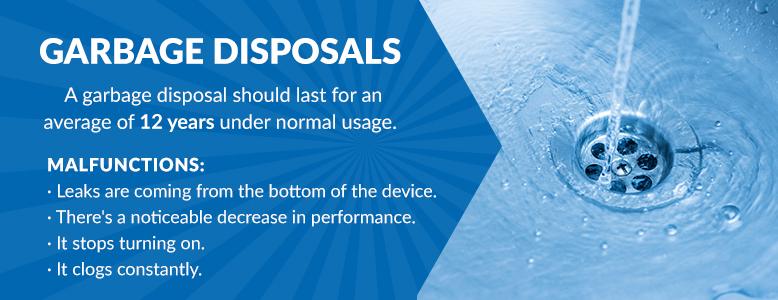
Symptoms of a Malfunctioning Unit: Even though its job is to dispose of small and soft food particles, some homeowners may forget that this appliance needs the same regular attention that a sink, water heater or any other home appliance would require. One significant problem is the failure of the motor or a crack in the disposal. Be aware of the following symptoms that will help identify a defective garbage disposal or motor:
- Leaks are coming from the bottom of the device.
- There's a noticeable decrease in performance.
- It stops turning on.
- It clogs constantly.
When You Should Replace Your Garbage Disposal: If you follow the instructions for maintenance and cleaning procedures found in the garbage disposal's user manual, you should be able to replace your garbage disposal toward the end of the estimated average life cycle. If you are utilizing your disposal in the most responsible ways possible and you still experience the symptoms above, it may be time to consider a new unit.
Mr. Rooter's Tips: Make an effort to ensure no items fall into the disposal unless they're able to be disposed of properly. Even by accident, some items may find their way into the disposal and harm the blades or motor when it's turned on. These items include metal or plastic utensils, vegetables that can bind the blades, potatoes, corn husks, pepper stems, rinds, grease and oils, pits and seeds, coffee beans and grinds, bones, shells, pasta and rice, dough and marshmallows.
5. Dishwashers
Average Lifespan: Though dishwashers were once considered a luxury or an add-on, many homeowners now find them to be essential items in their kitchens. One of the many appliances that take care of your chores for you, the dishwasher is a trusty device that has a relatively long lifespan. On average, you should be able to rely on your dishwasher for at least seven to 12 years, with 10 years being a reasonable estimate. However, factors like brand and usage could impact longevity.
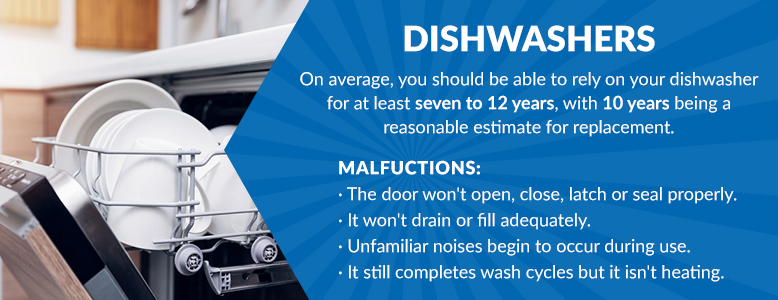
Symptoms of a Malfunctioning Unit: Few would appreciate the hassle of loading a dishwasher full of plates, cups and cutlery only to find out it's stopped working properly. Unfortunately, every appliance has the potential to break down over time. Before your machine gets too damaged to repair, learn how to recognize the symptoms of a dishwasher that may need expert attention.
You should consider repair or replacement if:
- The door won't open, close, latch or seal properly.
- It won't drain or fill adequately.
- Unfamiliar noises begin to occur during use.
- It still completes wash cycles but it isn't heating.
When You Should Replace Your Dishwasher: Though repairing a dishwasher is a hassle, some issues can be fixed relatively inexpensively. There are some problems, however, that are too cumbersome, expensive or important to justify simply repairing the machine. You may need to replace your dishwasher if it's aged more than 10 years, if the control board is inoperable, if the machine fails to deliver a proper wash cycle or if any repairs will cost more than half of a new unit's purchase price.
Mr. Rooter's Tips: Both residential and commercial dishwasher owners can benefit from the consistent practice of preventative maintenance. Check regularly for any buildup of rust, lime or molds inside the dishwasher. Make sure there are not any leaks outside of the unit or excess dripping inside the unit after the cycle has completed. Examine all of the drains, pumps and nozzles to make sure they are free of clogs or mold. Also, make sure the machine consistently performs a successful cleaning cycle under normal circumstances.
6. Washing Machines
Average Lifespan: When you've got an empty closet and a hamper full of clothes, you're going to want to be confident that your washing machine is ready to refresh your wardrobe. Thankfully, a washing machine should last an average of 14 years. This applies to most top or front-loader machines that average one wash cycle per day. Of course, large families that may require double-digit loads per week may cause this length of time to be shortened. Refer to the cycle rating for your specific washing machine for more accurate estimates.
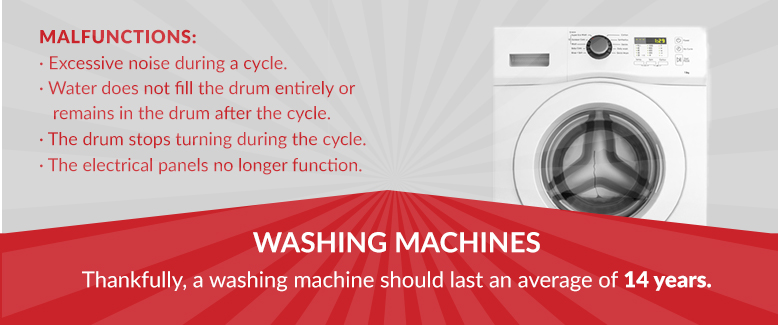
Symptoms of a Malfunctioning Unit: When an individual is overloaded with more work than they can reasonably handle, they experience stress. A washing machine is no different. Although they are rated to perform efficiently for an estimated number of cycles, this rate can be instantly reduced if the machine is forced to endure oversized loads. This stress places a hardship on all components of the machine and can contribute to a shorter lifespan. Wash only appropriately-sized loads and look for the following identifiers of performance issues:
- Excessive noise during a cycle.
- Water does not fill the drum entirely or remains in the drum after the cycle.
- The drum stops turning during the cycle.
- The electrical panels no longer function.
When You Should Replace Your Washing Machine or Dryer: Many people purchase washing machines and dryers simultaneously so that their complementary cycles can work in-tandem to meet specific needs. Unfortunately, either device could reach an early end to its life cycle due to mechanical issues. You may need to replace the appliance if it leaks, has a crack in the tub, contains an odor that won't dissipate, makes loud noises or has ceased to provide an efficient wash cycle.
Mr. Rooter's Tips: First and foremost, be responsible when loading each cycle. Though you may want to cut down on the number of loads you create by combining two into one, this may put damaging stress on the unit. Place a drip pan beneath the machine to catch any water leaks and make sure the machine is level and at least four inches away from a wall. Also, clean the tub periodically to prevent buildups of mold and odor as well.
7. Pipes
Average Lifespan: Whether you can see them or not, the pipes running throughout your home are some of the most important aspects of your living space. Your plumbing system includes the piping and drains that successfully bring clean water into the home and swiftly remove used water. Fortunately, many piping materials have long lifespans. You'll receive nearly a century of longevity with brass, galvanized steel and cast-iron pipes. Copper will provide for 80 years, and even PVC pipes will lend between 25-40 years of use.
Symptoms of a Malfunctioning Unit: Your home's system of pipes may not be readily observed, but it's important to make an effort to inspect any and all exposed pipes annually. It doesn't matter if your home was constructed last year or last century — diligent checkups on your pipes help you identify and rectify problems as soon as possible. Make sure you look for the following during your yearly inspections:
- Cracks and leaks of any size or volume.
- Brown or yellow discolored water in the bathtub.
- Signs of corrosion on the tubing, which includes discoloration, flaking, dimples or stains.
When You Should Replace Your Pipes: Repairing or replacing the plumbing system of your home is not a job for amateurs. This project will require the skill and knowledge of an experienced plumber. They'll be able to effectively assess your situation and determine if a repair or replacement of piping is necessary.
Mr. Rooter's Tips: Although there's only so much you can do to prevent a problem with your plumbing system's pipes, proactively inspecting the visible or accessible pipes in your home will help you stay aware of any potential problems. If you notice any leaks around the piping or water spots appearing on the ceiling, floor or walls, call Mr. Rooter Plumbing. We're available 24/7 to assess and fix all of your plumbing system's problems.
8. Sewer Lines
Average Lifespan: Sewer lines are the unsung heroes of the home, whisking away dirty water with the flush of a toilet, but they eventually wear down. Fortunately, their lifespans are often quite long. Clay was a commonly-used material for a long time, and there are some that are still in existence from more than 100 years ago. Still, they will need to be replaced at some point.
Symptoms of a Malfunctioning Sewer Line: A broken sewer line stinks — literally. Unfortunately, there are a number of reasons why a pipe may burst. Preventative maintenance can help alleviate these chances, but simple factors like aging, improper installation, debris buildup, environmental impacts or city sewer line backups can cause a pipe to burst or crack. It's important to contact Mr. Rooter Plumbing immediately if you notice any of the following:
- Cracks found in PVC or ABS pipes from hot water that exceeds the pipe's temperature rating.
- Cracked or brittle clay pipes due to improper installation.
- Cast-iron pipes that become rusty or corroded during to the end of their lifespan.
- Gurgling noises, sewage backup or a lack of water in the toilet.
- Foul odors around your property.
When You Should Replace Your Sewer Lines: If you have a cracked, brittle or burst sewer line, it's imperative that you get a trained professional to repair or replace the line as soon as possible.
Mr. Rooter's Tips: Even though there are factors well beyond your control, you can still attempt to preserve the integrity of your sewer lines by performing preventative maintenance. Enlist the help of a plumbing specialist who will periodically clean your drains and inspect the lines to ensure that all buildups, clogs and cracks are tended to as soon as possible. If you
If you do find yourself needing sewer line repair or replacement, trenchless options such as pipe bursting offer minimal disruption to your property and often faster repair times.
9. Leach Fields and Septic Pumps
Average Lifespan: Septic systems, comprising of a tank and leach field, will typically last for 25 to 30 years. The leach field itself should last for at least 20 years. This estimate is assuming that the septic system receives regular maintenance and was properly installed.
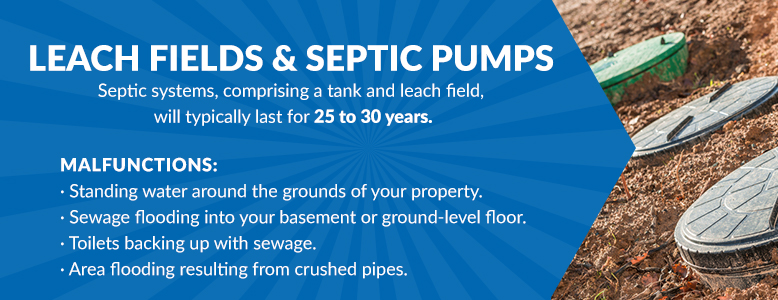
Symptoms of a Malfunctioning Unit: Not unlike sewer lines, the telltale signs of a leach field or pump problem will often be readily apparent in appearance and smell. Some obvious signs that your drain field is experiencing a serious issue include:
- Standing water around the grounds of your property.
- Sewage flooding into your basement or ground-level floor.
- Toilets backing up with sewage.
- Area flooding resulting from crushed pipes.
When You Should Replace Your Leach Fields and Septic Pumps: Clogged drain fields caused by septic pumps are often expensive to repair. Once the field becomes severely clogged, it requires a replacement. It's important that you replace it as soon as possible to avoid contaminating groundwater and well water and to prevent the spread of bacteria and disease to humans, animals and plant life.
Mr. Rooter's Tips: Like many other systems in your home, performing consistent preventative maintenance is one way to attempt to prevent a septic failure. Be mindful of what you flush down your drains and toilets and do not overuse your water supply. Have your septic system inspected annually and pump the system every few years.
Call Mr. Rooter of Oneida for Plumbing Repairs
The lifespan of the various plumbing systems and appliances throughout your home may range from a few short years all the way up to over a century. These machines, devices and systems are essential resources that enable you and your family to live comfortably, conveniently and accomplish your daily routines and household chores without issue. Preventative maintenance and routine inspection will help you keep these systems operating at peak efficiency.

Why have Oneida residents trusted Mr. Rooter Plumbing for nearly half of a century?
- We're licensed experts that have decades of experience.
- All of our plumbers are insured to give you peace of mind.
- We provide convenient in-home estimates, so you know exactly what the cost entails.
- We guarantee our parts and workmanship.
- We provide upfront flat-rate pricing with no extra charge for service on weekends, holidays or evenings.
- You can schedule an appointment at a time that is convenient for your family.
Mr. Rooter Plumbing of Oneida is a locally owned and operated plumbing systems and emergency repair service that is available to meet your needs around the clock. Our courteous, uniformed professionals are ready to provide you with the repairs and replacement services you need 24 hours a day, seven days a week. Let us help you keep your home running smoothly. Call Mr. Rooter of Oneida for all of your plumbing needs.
